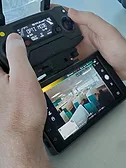Security & Business Resilience
Radio frequency: An airborne threat to corporate and government networks
Radio frequency espionage is a growing concern for cybersecurity, and this trend is bound to continue.
July 6, 2020
Sign-up to receive top management & result-driven techniques in the industry.
Join over 20,000+ industry leaders who receive our premium content.
SIGN UP TODAY!Copyright ©2026. All Rights Reserved BNP Media.
Design, CMS, Hosting & Web Development :: ePublishing














